Blog
Go backThe F-Bomb Revolution: How "Fuck" Conquered Media, Tech and Branding
No-Filter Zone · June 30th, 2025
From Taboo to Mainstream: Fuck in Film & TV
Once upon a time in Hollywood, "fuck" was the Voldemort of words – unspeakable on screen. The 1930s Hays Code flat-out banned profanity, enforcing a prudish silence on the F-word. Fast-forward to 1970, when Robert Altman's war comedy MASH slipped in the first mainstream cinematic F-bomb – a medic mutters "… his fucking head is coming right off," making movie history. This trailblazing "fuck" opened the floodgates.
By the late 20th century, filmmakers were swearing like sailors on shore leave. Marty Scorsese's Goodfellas dropped some 300 F-bombs in 1990 and Quentin Tarantino's Pulp Fiction (1994) added a cool 265. At the time, these counts felt shocking – Scarface's infamous 207 F-words in 1983 had already given censors heartburn. Little did they know, the record books would be utterly fked* in the new millennium.
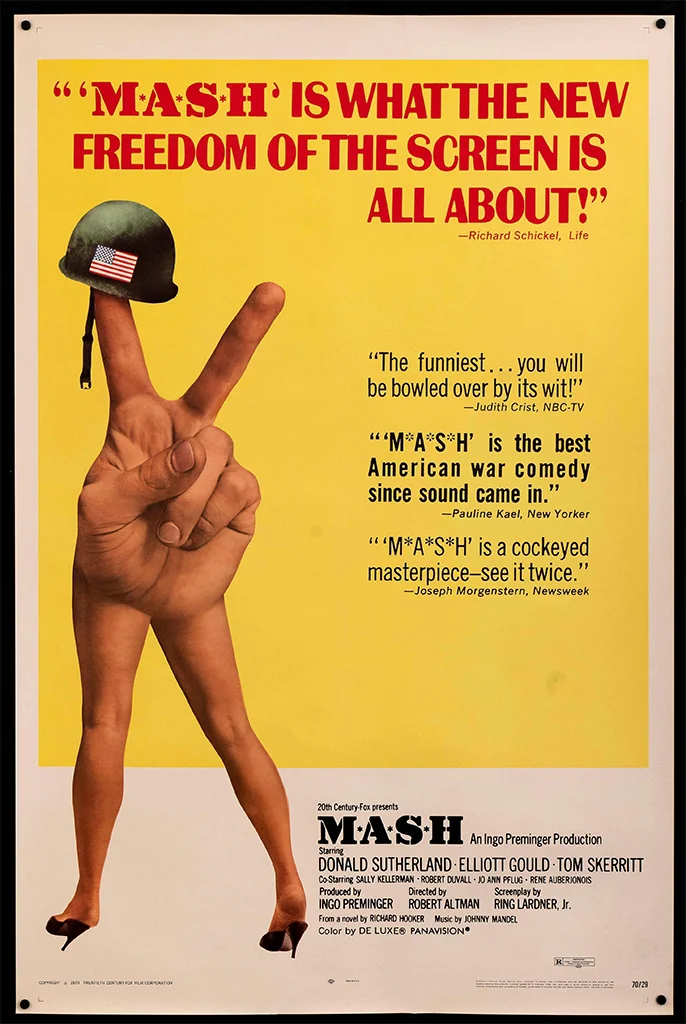 1970’s MASH-the war comedy that lobbed Hollywood’s first mainstream F-bomb and blew the Hays Code to hell.
1970’s MASH-the war comedy that lobbed Hollywood’s first mainstream F-bomb and blew the Hays Code to hell.
 The Wolf of Wall Street (2013) shattered F-bomb records with 569 instances - that's one "fuck" every 21 seconds for three hours straight.
The Wolf of Wall Street (2013) shattered F-bomb records with 569 instances - that's one "fuck" every 21 seconds for three hours straight.
Cue The Wolf of Wall Street (2013), where characters swore as freely as they snorted Quaaludes – 569 instances of fuck, a total so eye-popping it sparked its own mini-controversy. Yet even Leo DiCaprio's potty mouth got outdone: a Canadian mockumentary aptly titled Swearnet: The Movie (2014) went nuclear with 935 F-words, earning a Guinness World Record for profanity overload. For context, that's an average of over 8 f-bombs per minute – basically a Tarantino script on steroids. Even a 2005 documentary simply named Fuck crammed in 857 uses, turning the word itself into the star of the show. No wonder "fuck" is thought to be the most-used vulgar term in all of film.
Of course, TV wanted in on the action too – albeit cautiously. On U.S. broadcast TV, fuck remained the Big One: verboten except in live slip-ups. (Remember U2's Bono exclaiming "fucking brilliant" at the 2003 Golden Globes, prompting FCC commissioners to clutch their pearls and deem it "indecent"?) Meanwhile, cable shows took full advantage of looser rules. HBO's western Deadwood (2004–06) famously averaged over 1.5 "fucks" per minute – nearly 3,000 total across three seasons – as a gritty stylistic choice.
The cops on NYPD Blue pushed boundaries in the '90s and by the 2000s, even basic cable dipped a toe in (Comedy Central's South Park gleefully lampooned censorship – an earlier episode tallied 200+ shits and their movie gave us the immortal song "Uncle Fa"). In the UK, the Sex Pistols' profanity-laden 1976 TV interview ("you dirty fucker") caused a national scandal, while nowadays the word slips out on post-watershed programming with only mild tut-tutting. The journey from taboo to (almost) mainstream for "fuck" in entertainment has been a wild ride: from zero tolerance to a begrudging acceptance that sometimes a scene just needs that perfect "fuck it."
Rock, Rap and Radio Edits: Fuck in Music
Music has long been a battlefield for profanity and propriety. By the late '60s, rockers were flirting with the F-word – John Lennon snuck a quick "fucking peasants" into Working Class Hero (1970) and country rockers The Flying Burrito Brothers titled a live album "$1,000 Wedding" with a big F-bomb on the cover (result: some very unhappy record executives). But it was the punk and rap revolution that really said "fuck it" (literally).
The Dead Kennedys released Too Drunk to Fuck in 1981, a punk anthem so provocatively titled that the BBC banned it from Radio 1; nonetheless, curiosity fueled its rise to #36 on the UK Singles Chart – the first Top-40 hit with "fuck" in its name. (Record shops that refused to stock it got trolled by the band's sticker: "Caution: yet another stodgy retailer afraid to warp your mind by revealing the title… peel slowly and see." Oh, the sass.) Meanwhile, hip-hop group N.W.A. sparked FBI attention with Fuck tha Police (1988) – a song whose very title guaranteed it would never, ever be played on ClearChannel radio, yet it became an underground classic. By the '90s, explicit lyrics had gotten so prevalent that Tipper Gore's PMRC slapped "Parental Advisory" stickers on albums – a move that, ironically, only made teens want the "dirty" versions more.
Once fuck breached music's frontline, artists started using it as both emphasis and rebellion. In 2000, Limp Bizkit released "Hot Dog," a nu-metal track where Fred Durst proudly proclaims, "If I say fuck two more times, that's 46 fucks in this fucked up rhyme." – and yes, he actually hits 46 by the song's end. (Take that, Scorsese!)
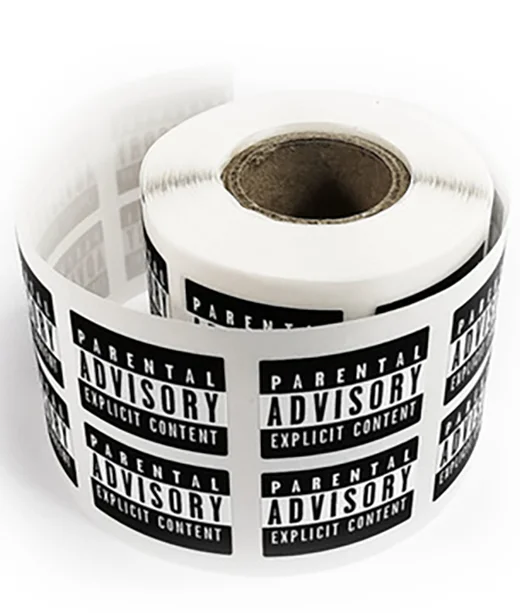 The infamous "Parental Advisory" sticker - originally meant to warn parents about explicit content, it quickly became a badge of honor that boosted album sales among rebellious teens.
The infamous "Parental Advisory" sticker - originally meant to warn parents about explicit content, it quickly became a badge of honor that boosted album sales among rebellious teens.
CeeLo Green's doo-wop throwback "Fuck You" (2010) was so darn catchy it topped charts despite requiring a radio-friendly alias ("Forget You"). From Green Day's "fuck America" punk spirit to Cardi B's unabashed "I don't give a fuck" swagger, the word has become a staple of musical expression across genres.
Of course, wherever fuck goes, censorship follows close behind with a bleep or a blank. Radio edits have given us gems like "flippin'" or awkward silences to mask the F-bombs. (Anyone who grew up with clean versions knows the pain of screaming along to "Y'all gon' make me ____ up in here" in DMX's Party Up.) Despite (or because of) censorship, profanity often increases a song's notoriety and memorability. Case in point: the Sex Pistols' "God Save The Queen" was banned for its crude "...she ain't no human being" vibe, but fans snickered at hearing Johnny Rotten snarl an f-bomb in concert. Modern pop occasionally dips an explicit toe in too – Olivia Rodrigo's "driver's license" surprised listeners with a plaintive "I still fucking love you" in the bridge, left uncensored on album and resonating with millions for its raw emotion. Whether used for rage, humor or catharsis, fuck has proven its lyrical utility. As one rock documentary quipped, "when you need to really make a point, nothing quite punches like an F-bomb." And if the charts are any indication, listeners fucking agree.
WTF, Internet?: The F-Bomb in Internet Culture
On the internet, "fuck" found its natural habitat. Freed from FCC censors and corporate gatekeepers, early online forums and chatrooms were rife with creative profanity. The F-word became punctuation for the digital generation: WTF (what the fuck) and OMFG (oh my fucking god) slipped into everyday online lingo. From rage comics' "FUUUUUU-!" meme (a stick-figure screaming a never-ending f to convey epic frustration) to the ubiquitous "no fs given" catchphrase, the web embraced profanity as a form of humor and honesty. The phrase "fuck it" itself became a meme-able expression of joyful nihilism – hence the entire ethos of this blog. By the 2010s, internet users were casually dropping "AF" (as fuck) as an intensifier ("I'm tired AF"), without even thinking of its risqué origin. In gamer culture, an entire generation learned that getting "pwned" in an online match might earn you a "fuck!!!" in chat (or a more polite "GG" if you're lucky).
 The classic "FFFFFUUUU-" rage comic - an early internet meme that captured the universal feeling of frustration when technology fails at the worst possible moment.
The classic "FFFFFUUUU-" rage comic - an early internet meme that captured the universal feeling of frustration when technology fails at the worst possible moment.
Software developers took this and ran with it (into some very NSFW directions). The tech world's jargon is dotted with in-jokes like RTFM – "Read The Fucking Manual" – as a snarky reminder to newbies. One open-source license is literally called the WTFPL (Do What The Fuck You Want Public License), giving programmers legal permission to, well, do whatever the fuck they want with the code. It doesn't get more on-brand than that. In coding communities, frustration is often expressed through F-bombs: witness GitHub commit messages from bleary-eyed devs at 3 AM. (Yes, those are real messages like "whatever the fuck this commit is" or "fuck this, I'm going to bed" showing up in public repos. The struggle is real.) In fact, entire twitter bots and websites track developers' swearing, turning those late-night "WTF did I just write?" moments into communal comedy. And let's not forget the esoteric programming language Brainfuck, so named because it's deliberately designed to be a pain in the ass (there's truth in advertising!).
In internet culture, fuck isn't just a curse – it's a bonding tool and a punchline. A well-timed "gtfo" (get the fuck out) in a comment thread can elicit laughs and a dramatic "FUUUU-" gif says more than a thousand civil words ever could. Even the wholesome corners of the net have their sanitized stand-ins: "frick," "fudge," and the Battlestar Galactica-coined "frak" (geek-speak for fuck) let people vent pseudo-profanity without actually crossing the line. But make no mistake, the sentiment is the same. Whether screamed in all-caps on a forum or encoded in a meme, fuck has become the unofficial emoji of the internet's id – a versatile, emphatic shorthand for everything from outrage to glee.
Swearing in the Code: Tech's Love Affair with Fuck
It's no surprise that the software development community – known for its zero-BS candor – has embraced the F-word with open arms (and occasionally middle fingers). In open-source project discussions, you'll find passionate programmers dropping the occasional "this is fucking broken" or "WTF is this bug?!" when diplomacy fails. Linux creator Linus Torvalds famously isn't shy about profanity; he once straight-up flipped the bird in a talk and said "NVIDIA, fk you!" for their lack of Linux support, making him a kind of folk hero for fed-up engineers. Mailing list archives and Git commit histories are littered with gems: "Shut the fuck up and show me the code" could practically be the unofficial motto of many a hackathon. And who among us hasn't seen a comment in code like: // TODO: fix this shit or if(error) goto fail; // we fucked up – developers often treat code as a confessional, venting frustration in the only semi-private place they can: the source itself.
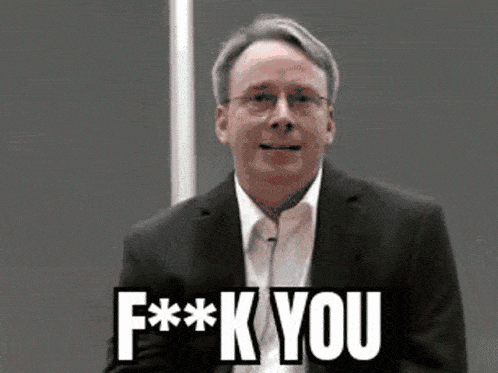 Linux creator Linus Torvalds' infamous "NVIDIA, f**k you!" moment became an instant classic in tech circles - and a reminder that even the most respected figures in computing occasionally need to drop an F-bomb.
Linux creator Linus Torvalds' infamous "NVIDIA, f**k you!" moment became an instant classic in tech circles - and a reminder that even the most respected figures in computing occasionally need to drop an F-bomb.
Even in user-facing tech, we see flashes of F-powered humor. Error messages in some edgy software have quipped things like, "Something went wrong (we're as pissed as you are)." The culture of tech startups – with their irreverent T-shirts and hacker slang – sometimes winks at profanity. One startup famously sold stickers reading "Move Fast and Break Shit" (a play on Facebook's mantra) and you might catch a Silicon Valley engineer wearing a shirt that says "RTFM" or "No WTFs". The UX writing world also occasionally debates: is it ever okay to drop a mild curse in an app's copy for relatability? (Answer: rarely, but some brands with a playful tone have tried "damn" or "hell"; "fuck" is still largely off-limits unless your app itself is about swearing – looking at you, novelty soundboards).
And let's not forget the legendary commit messages that circulate as memes. There's the one where a frustrated dev wrote: "Holy shit, I fixed it!" and another who chronicled a bug fix saga with commits like "fix attempt #9 – f this stupid bug" followed by "okay it's working, fuck you bug." The website LateNightCommits.com logs real examples: e.g. "look man i dont fucking know if this shit will work" or "fuck other ppl code imma just write my own" – pure poetry of exasperation. It's crude, yes, but it's authentic – a rallying cry that says: coding is hard and sometimes you just gotta drop an F-bomb and push through. In tech, swearing has become a subcultural badge of honor, a sign that you're battle-hardened by debugging at 4 AM. As one developer jokingly measured code quality: the only valid metric is "WTFs per minute." When that number's too high, time to refactor – or take a walk before you drop a "fuck it, ship it" in desperation.
Bold Brands and Profane Products
Marketers usually tread carefully around the F-word – but a brave (or cheeky) few have weaponized it for attention. The granddaddy of profanity-as-branding is French Connection UK (FCUK). In the late '90s, this fashion retailer realized their acronym just so happened to be one transposed letter away from a certain expletive and an infamous ad campaign was born. "fcuk fashion" billboards popped up, provoking gasps and giggles. The public got the joke – it was fuck without technically saying it, a naughty wink. The campaign drew loads of complaints (even Parliament debated it) yet proved wildly successful with young shoppers. The Advertising Standards Authority begrudgingly let it slide, ruling the slogan wasn't explicitly offensive – and FCUK laughed all the way to the bank.
Notable F-Adjacent Brands & Products
- FCUK (French Connection UK) - Fashion brand whose acronym created plausible deniability while clearly evoking the F-word
- FUCT - Streetwear label pronounced exactly as you'd expect, founded in 1990 and later won a Supreme Court case on free speech grounds
- Fucking Hell - German pilsner named after the Austrian village of Fucking and the German word Hell (pale lager)
- Fuckoffee - London coffee shop forced to change its sign to "Fkoffee" after landlord complaints
- KFC's "FCK" apology - Award-winning 2018 ad where KFC rearranged its letters to apologize for a chicken shortage
Around the same time, streetwear label FUCT (est. 1990) was delighting skaters and enraging parents. Pronounced as you'd expect, FUCT slapped its four-letter name on t-shirts and hats, thumbing its nose at decorum. (The brand's founder, Erik Brunetti, even took a trademark case for "FUCT" to the U.S. Supreme Court on free speech grounds – and won in 2019. The Court essentially said, "Yeah it's vulgar, but that's not illegal." How fucking cool is that?) Not to be outdone, a few years later came Comme Des Fuckdown – a parody of high-fashion label Comme des Garçons. This design printed "COMME des FKDOWN" on beanies and hoodies and celebrities like Madonna and Justin Bieber rocked them in public. Madonna even wore her "Fuckdown" hat on stage in 2014, gleefully scandalizing onlookers. By the mid-2010s, however, these tactics had almost become quaint – once everybody's dropping F-bombs, the shock wears off. As one fashion writer noted, the FCUK tees now look tame compared to earlier eras' X-rated punk designs.
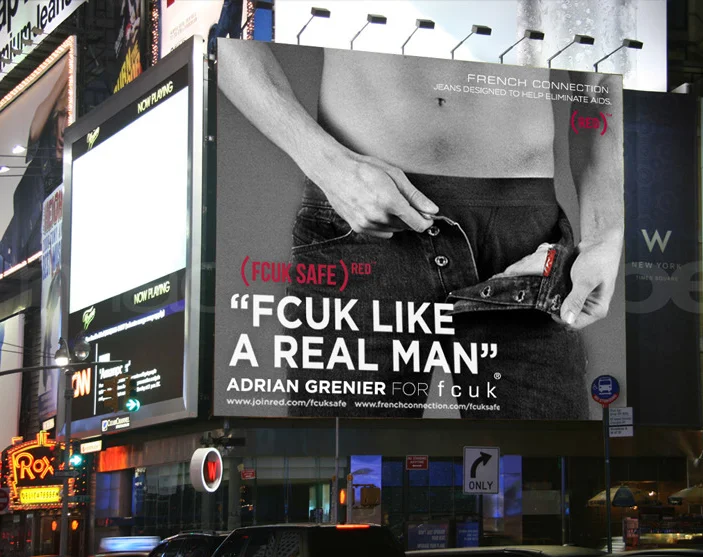 French Connection UK's provocative "fcuk fashion" campaign pushed the boundaries of acceptable advertising in the late 1990s, generating both controversy and massive sales.
French Connection UK's provocative "fcuk fashion" campaign pushed the boundaries of acceptable advertising in the late 1990s, generating both controversy and massive sales.
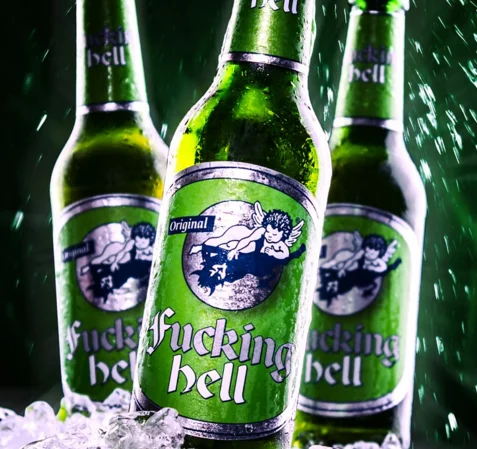 Fucking Hell beer - named after the Austrian village of Fucking and the German word for pale lager (Hell) - won a trademark battle by arguing it was simply a geographic designation plus a beer style.
Fucking Hell beer - named after the Austrian village of Fucking and the German word for pale lager (Hell) - won a trademark battle by arguing it was simply a geographic designation plus a beer style.
It's not just fashion – food and drink brands have gotten in on the fun too. The award for ballsiest beer name goes to Fucking Hell. Yes, that's a real German pilsner introduced in 2011, named after the Austrian village of Fucking and the German word Hell (meaning pale lager). The audacity was off the charts. Initially, even EU trademark officials tried to block it for being too profane, but the brewers argued it's literally just a place name plus a beer term – and they eventually won the right to trademark "Fucking Hell". The beer is now sold internationally, eliciting chuckles and "I can't believe I'm drinking this" selfies. (Its slogan writes itself: "It's a hell of a beer… Fucking Hell!") Meanwhile, a London coffee shop named "Fuckoffee" made headlines after its owner was forced by landlords to remove the sign for being offensive. The café fought back with humor: after taking down the sign, they cheekily put up a new one reading "Fkoffee – (we're told we have to censor this sign)" to keep the rebellious spirit alive. There's also a hot sauce in the UK literally called "Holy Fk". Profanity, it seems, can spice up more than just language – it sells products, so long as you know your audience (and don't mind limiting your Walmart appeal).
Even corporate giants have flirted with f-ange. In 2018, KFC ran a brilliant apology ad in British newspapers after a chicken shortage fiasco: it showed an empty bucket with the logo letters rearranged to "FCK" – basically a wordless "fuck, we screwed up" acknowledgment. It was bold, disarming and won a lot of goodwill (and advertising awards) for dropping a not-so-hidden F-bomb without actually spelling it. Similarly, there's a craft beer out of Scotland named "Buckfast Tonic Wine" that marketed with the slogan "Get Bucky'ed" (say it fast). Okay, that one's a stretch – but the intent to be edgy is clear. The trend even hit dating apps: one called "Thursday" ran tube ads reading "No small talk. No fake profiles. No Fking about." – making commuters do double-takes and likely scoring free press.
The takeaway? If your brand is targeting a hip, disillusioned crowd, a well-placed quasi-fuck can signal that you're bold, honest and over traditional niceties. It's the linguistic equivalent of a mic drop. But be warned: it's a fine line between clever and crass. As French Connection learned, overuse can make it feel gimmicky. Still, when done right, profanity in branding cuts through the noise with a hearty "**** yeah, we went there." And in today's attention economy, that's marketing gold.
Moderation and #$%@! Censorship in the Digital Age
All this free-wheeling profanity begs the question: how do the gatekeepers of modern content – the YouTubes, Apples and TikToks of the world – handle "fuck"? The short answer: very nervously. These platforms walk a tightrope between letting people express themselves and keeping things "family-friendly" (and advertiser-friendly).
Take YouTube. In recent years, creators have faced an evolving (some say head-spinning) policy on swearing. At one point, YouTube decided that any video with a single "fuck" uttered in the first 15 seconds would be demonetized – instant ad revenue kiss-of-death. Content makers were aghast: years of videos, including ones where an F-bomb was totally contextually appropriate, suddenly got flagged. After a backlash of biblical proportions, YouTube eased up in 2023: now you're allowed "moderate and strong profanity" after the first ~7 seconds without losing all ads. They even acknowledge not all curses are equal – "fuck" is officially categorized as "strong profanity," a notch above words like "shit" or "ass". (Imagine being the policy wonk who had to write the sentence "'Fuck' is stronger than 'bitch'" for an official Google document – that deserves a drink.) But even with the new rules, it's a bit confusing. Excessive profanity throughout a video can still limit ads and dropping F-bombs in titles or thumbnails is a no-go. The algorithm essentially says: curse if you must, but do it sparingly and keep it out of the spotlight. Many YouTubers still self-censor with bleeps or the funny "f@#k" spelling in captions to avoid any risk – because nothing kills a comedic rant faster than YouTube's demonetization bot.
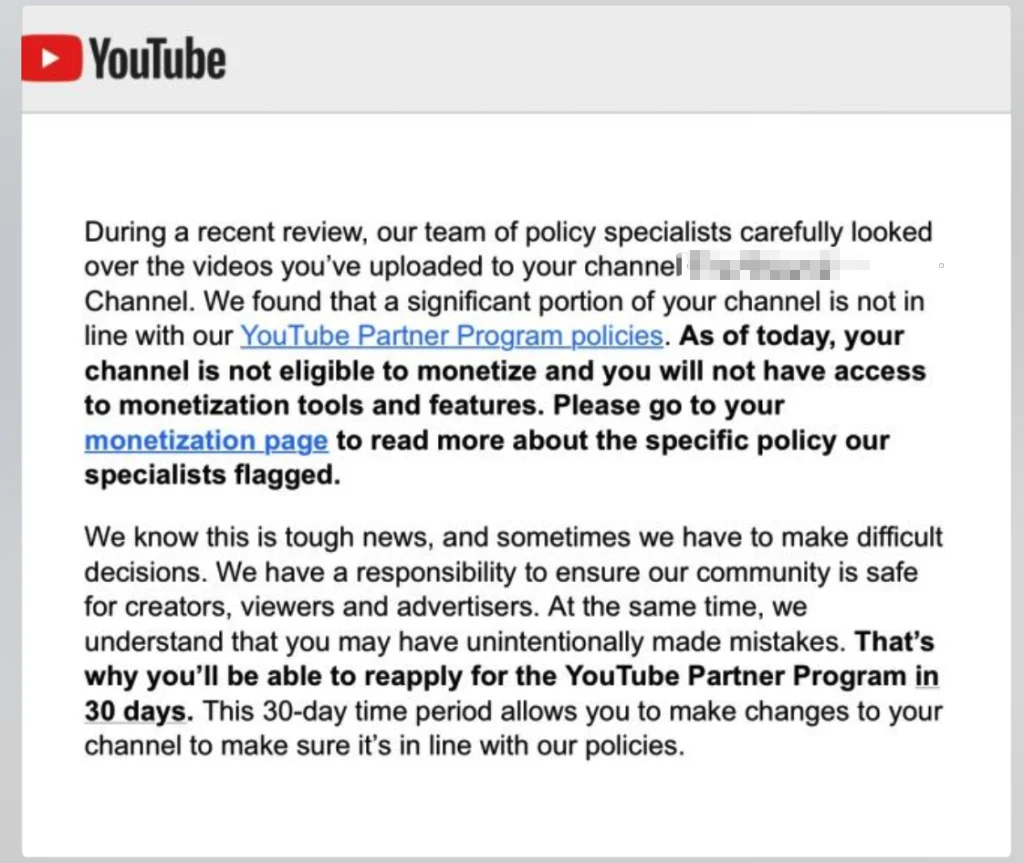 The dreaded YouTube demonetization notice - creators have developed elaborate strategies to avoid triggering the algorithm's profanity filters while still expressing authentic emotion.
The dreaded YouTube demonetization notice - creators have developed elaborate strategies to avoid triggering the algorithm's profanity filters while still expressing authentic emotion.
Over at Apple, the stance is more puritanical. The App Store guidelines flatly prohibit apps with "any content that uses profanity," including in the name or screenshots. Try to publish "Fk My Life – Daily Quotes" or something and Apple will show you the door. They once even rejected an e-book reader app because one of the millions of books it could display had the word "fuck" in it – no joke. Developers have had to rename their creations to appease the iGuardians: e.g. the novelty app "What The Fck" had to become "What the Forecast?!" with a cute asterisk. On Apple Music and iTunes, explicit songs are allowed but rigorously tagged – and Siri will coyly say "beep" if you ask her to play "Fuck You" by CeeLo Green out loud. When it comes to profane content, Apple plays it conservative, curating a squeaky-clean walled garden. (Their reasoning: an iPhone is for everybody, including kids and grandmas, so they'd rather be safe than sorry. Still, it's a bit ironic when you consider how many times Steve Jobs probably said "fuck" in the Apple offices – those who knew him say his tirades were legendary.)
And then there's TikTok, the wild child of social media. TikTok's official community guidelines discourage "vulgar language," but it's something of an open secret that the algorithm itself might suppress videos with lots of profanity (or at least not push them to the coveted For You Page). Savvy TikTokers have adapted by using subtitles like "fck" or substituting words – hence the meme of people saying "I'm in me mum's car, broom broom – oh shoot!" or using "freak" instead of "fuck." In fact, a whole lexicon of TikTok euphemisms has evolved: "seggs" (sex), "unalive" (dead) and yes, "fluck" or just a blank pause for you-know-what. This linguistic creativity isn't just for kicks; it's a strategy to dodge moderation bots that auto-flag naughty words. Even outside TikTok, on Instagram or Facebook, you'll often see captions like "Fk Cancer" with asterisks – because the AI is always watching. Major platforms want to appear wholesome to both advertisers and international regulators, many of whom have stricter obscenity laws. So while they won't ban fuck outright (it's too pervasive for that), they certainly won't highlight it. You won't see an app featuring "Fuck" trending on the App Store, nor a TikTok hashtag #fuckwithme front and center. The word exists in a semi-shadow state online: ubiquitous in user content, yet officially sanitized wherever possible.
Internationally, moderation varies wildly. A platform in, say, Germany might be chill with "fuck" (Germans hear Scheiße on TV routinely, after all), whereas one in the Middle East will have zero tolerance and actively filter it out. Netflix famously had to bleep The Queen's Gambit in certain territories when a character exclaimed "fucking Russians" – local censorship boards weren't amused. And in perhaps the greatest proof that context is everything: an app about the village of Fucking, Austria would be seen as totally innocent locally (it's just a place name!), yet might get blocked from global app stores just for that notorious F-word.
In summary, the big tech gatekeepers practice a sort of polite hypocrisy: Fuck is fine, they imply, just not where the uninitiated can see or hear it. They rely on us, the users, to know when to drop our F-bombs – and when to bleep them out. Which, let's be honest, we've gotten pretty damn good at. F@#k yeah.
Local Flavors: Fuck Around the World
English may have exported "fuck" to the globe, but every language has its own spicy swear arsenal. Still, the cultural weight and usage of fuck (and its local equivalents) can vary wildly by region – sometimes leading to comical situations and clever workarounds.
Take the Irish "feck." Ireland's version of the F-word is so benign there that the sitcom Father Ted got away with characters saying "Feck off!" on primetime TV. It sounds just enough not like the real thing to be allowed, yet everyone knows what it stands in for. (As one Irishman joked, "Feck is what you say when you want to say fuck but can't – though in Ireland, you usually just say fuck.") Similarly, in the UK, "bloody" has long been a mild swear, but drop a "fuck" and you'll raise eyebrows unless you're at the pub. Meanwhile, across Europe, local tongues have their own heavy hitters: the Spanish "joder" (literally "to fuck") is used akin to "damn it," and Russians wield a fearsome roster of mat (obscene profanity) where "blyat" might be loosely compared to "fuck" in intensity. But intriguingly, English fuck itself has infiltrated youth slang in many countries. You might hear a French teenager drop a casually accented "fk, c'est pas vrai!" or a Swedish gamer yell "fakka!" (they sometimes add an extra a for flair) when frustrated. English swears carry a certain cool factor – they're global, edgy and oddly less "real" than native curses to non-native speakers. It's as if saying fuck in a second language doesn't feel as blasphemous – a loophole many happily exploit.
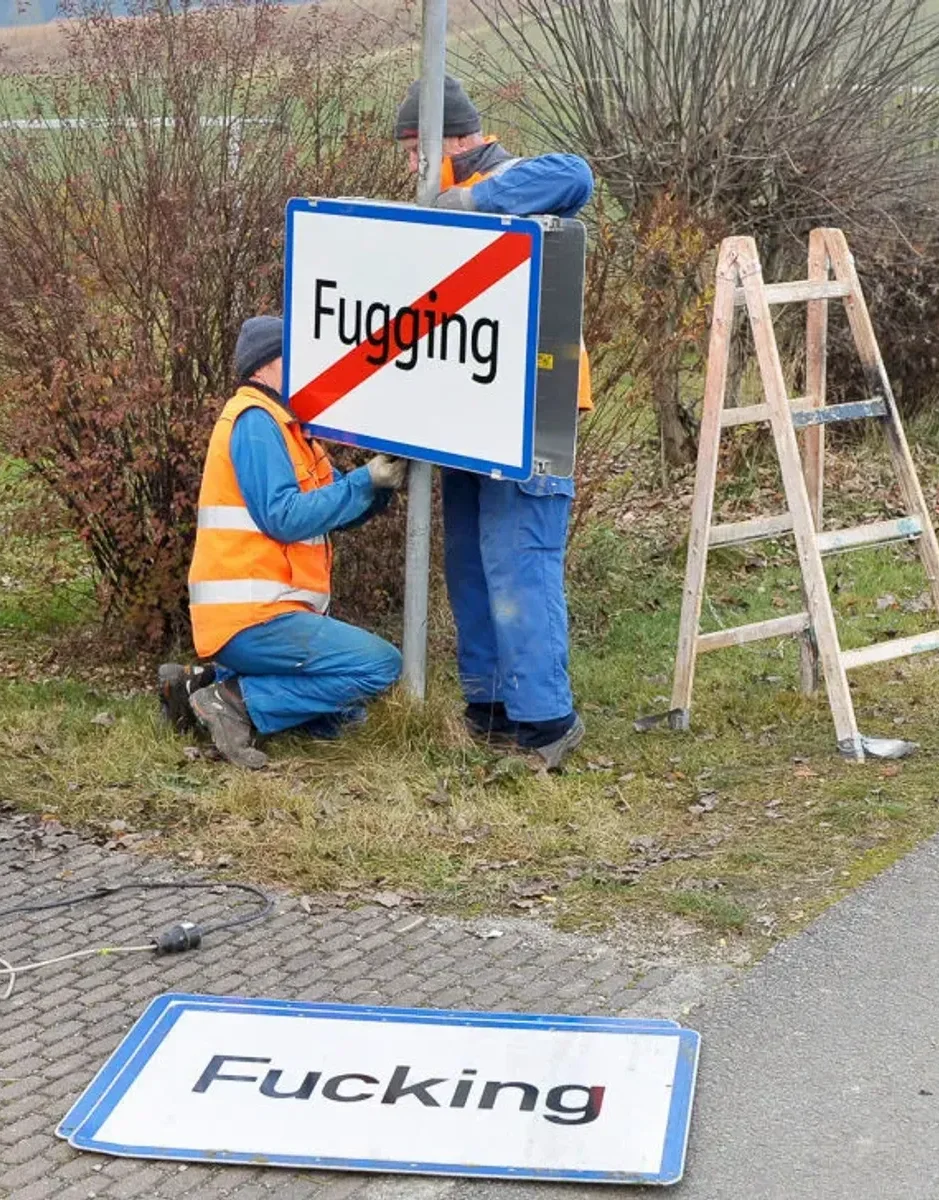 A city limits sign from the formerly-named village of Fucking, Austria – a real place that got so tired of English-speaking tourists stealing its signs, it changed its name in 2021.
A city limits sign from the formerly-named village of Fucking, Austria – a real place that got so tired of English-speaking tourists stealing its signs, it changed its name in 2021.
Then there's the matter of branding and media in other languages. Profanity in one tongue can sound exotic in another. Case in point: when IKEA launched a workbench called Fukta (which just means "moisture" in Swedish), English speakers snickered; similar giggles greeted Nintendo's puzzle game "Zack & Wiki: Quest for Barbaros' Treasure" which abbreviates to, um, Z&W:QfBT (unfortunate). Some brands have learned to preempt this – the Swiss chocolatier Milka nixed a bar name "Lila Fck" (short for some German phrase) once they realized how it read in English. And let's pour one out for the town of Fucking, Austria (pronounced "FOO-king" by locals) – for years, its road signs were stolen by cheeky tourists and its name became a meme for "visit this hilariously named village!". Tired of the jokes, the village actually voted to change its name in 2021 to Fugging. (Yes, Fucking literally gave a f and unfucked its name. End of an era.) Interestingly, the residents of Fucking had capitalized on their notoriety with a line of merchandise (from postcards to, reportedly, a "Fucking beer" before Fucking Hell lager took over). It's a reminder that what's a simple word in one language can be a profane punchline in another.
Different cultures also have varying tolerance in media. In Japan, for instance, you won't see native swear words in polite company, but dropping an English "fakku" in a song or anime occasionally happens to lend Western punk flair. Some European films include English fucks even in otherwise non-English dialogue for a gritty cosmopolitan vibe. And when it comes to dubbing and subtitles, translators often face the challenge: to fuck or not to fuck? Creative substitutions abound. The Spanish dub of South Park famously translated a barrage of swearing in one episode to local curses that matched intensity. Meanwhile, American TV edits of movies have given us the legendary "Yippee-ki-yay, Mr. Falcon!" (to replace "motherfer" in Die Hard 2). We could fill a book with these bowdlerized gems, but suffice to say, the spirit of fuck finds a way to shine through, even if disguised as fudge, frig or frickin'. (Heck, English itself had euphemisms like "fiddle-faddle" and "fustian" in centuries past – but none ever packed the punch of the real F.)
Despite local differences, fuck has become a bit of a lingua franca of frustration and emphasis worldwide. You'll find it painted on protest signs from Cairo to Moscow to Santiago (sometimes Anglicisms carry farther than native curses in global movements). And thanks to Hollywood and the internet, even people who don't speak a lick of English know this one magic word – and its power. In an odd way, "fuck" has transcended language barriers; it might be one of the first words someone learns in a new language (priorities, right?). It also morphs with accents: a Brit's "fookin' 'ell!", an Aussie's drawn-out "faaark", an Indian English speaker's playful "f**-uh", all are variations on a theme, each with local flavor.
So, whether it's "va fangool" in Italian (literally "go do it in an ass", used like "f-off"), "chuj" in Polish (very not-nice) or a plain old F-U-C-K shouted from a rooftop, every culture understands the cathartic release of a good swear. We might not agree on much in this world, but dropping an F-bomb is a nearly universal language – a cross-cultural sonic shrug that says "I'm human, I'm mad (or excited or shocked) and nothing else will do right now."
Why the #$%& Do We Swear? (The Science of Fuck)
Beyond the snickers and shock value, there's something almost… therapeutic about swearing. Science actually backs this up: "fuck" isn't just fun to say, it serves a real expressive purpose in our brains.
Psychologists have found that cursing can act as an emotional release valve – a spontaneous "fuck!" when you stub your toe might literally help you handle the pain. No, seriously: in a 2009 study, researchers had people dunk their hands in ice water and hold as long as they could. Those allowed to repeat a swear word endured significantly longer than those chanting a neutral word. Swearing, it turns out, triggers our fight-or-flight response, raising adrenaline and pain tolerance. As one scientist put it, it's a "drug-free, calorie-free, cost-free" painkiller we all carry in our vocabulary. Next time you drop an F-bomb after stubbing your toe, just tell any onlookers: "It's medicinal."
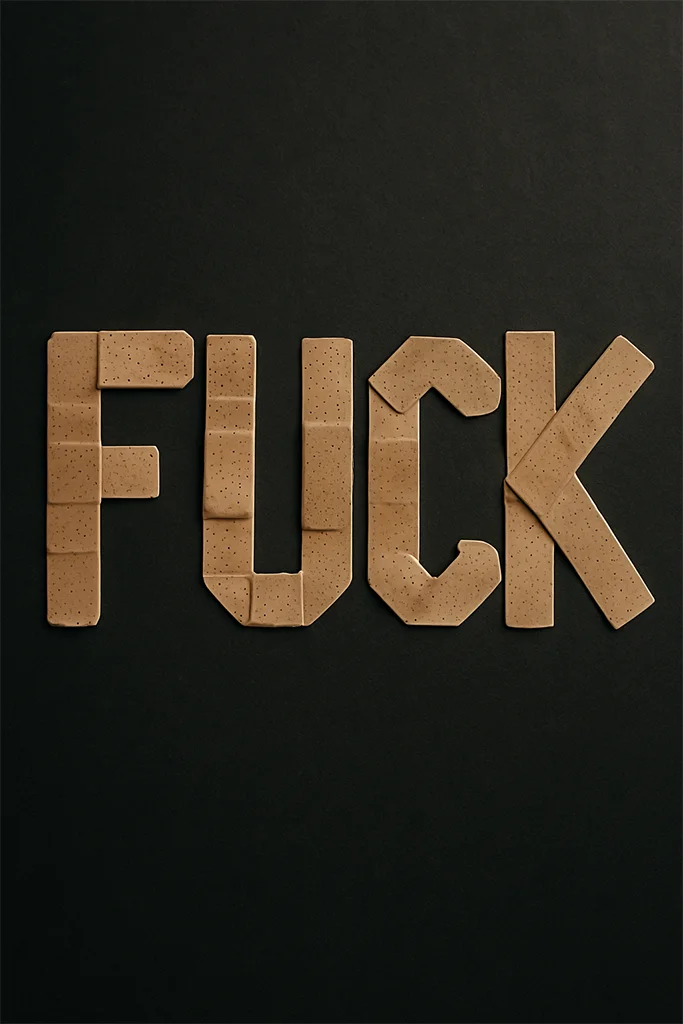 Scientific research has shown that swearing can increase pain tolerance by up to 33% - your mother was wrong, sometimes cursing is the healthiest response.
Scientific research has shown that swearing can increase pain tolerance by up to 33% - your mother was wrong, sometimes cursing is the healthiest response.
Swearing also seems to forge social bonds. Ever notice how a shared "fuck this" moment with coworkers can create camaraderie? Researchers have noted that using profanity among friends or teammates can increase solidarity – it's like linguistic glue that signals trust ("I'll swear with you, so we're comfortable together"). In fact, some studies even link moderate profanity use with perceptions of honesty and authenticity. People tend to find a speaker who occasionally swears (in a relatable way) more genuine – as if dropping an F-bomb shows you're not filtering or bullshitting. No wonder we love comedians who swear; it makes their stories feel raw and real.
Cognitively, our brains treat swear words differently than regular language. They activate emotional centers more than linguistic ones. That's why patients with certain brain injuries (that impair speech) can still curse a blue streak; the words live in the emotional speech circuits. It's also why taboo words are so memorable – one experiment found that people had better recall for swear words than neutral ones in a list, likely because the emotional jolt cements it in memory. Advertisers have picked up on this too: a dash of swear-y humor in an ad can make it stick (provided it's allowed to run at all). And indeed, how many of us instantly remember iconic movie lines because they had a well-placed profanity? ("Yippee-ki-yay, motherf*er!" – need I say more).
Then there's the catharsis – the pure relief – of swearing. The word "fuck" in particular, with that forceful "fuh" and hard "ck" sound, practically begs to be shouted when you're angry or astonished. It's like a pressure release button for the brain. Psychologist Steven Pinker describes swearing as a "strategic vocal weapon" – a way to vent aggression without punching a wall or to signal extreme feelings when normal words won't cut it. This cathartic effect might explain why even people who "never swear" sometimes erupt with an F-bomb in a crisis. It's deeply wired in us; even primates have been taught to sign rude words (like a chimpanzee spontaneously learning to sign "dirty" as a swear). We might say fuck is our civilized stand-in for a primal scream.
 Research shows that swearing during physical exertion can increase strength by up to 8% - explaining why you'll hear plenty of F-bombs at the gym.
Research shows that swearing during physical exertion can increase strength by up to 8% - explaining why you'll hear plenty of F-bombs at the gym.
Interestingly, studies also show that swearing can increase physical performance. Yes, dropping a few F's might help you lift heavier at the gym. Researchers at Keele University found that people cussing during a strength test had measurably more power than those who stayed polite. The theory is that swearing induces an adrenaline spike through "state disinhibition" – basically, letting loose with a swear unshackles your limits a bit, pushing you further. Perhaps that's why you'll hear weightlifters muttering curses before a big lift or athletes using colorful language to psych themselves up.
Of course, context is key. A swear word in the wrong setting (like a formal meeting or around kids) can cause social pain or conflict – we've mentally imbued these words with taboo, which is exactly why they have power. As a famed linguist once said, "They're called 'strong language' for a reason – use wisely." The push-pull between society's profanity police and the human need to express raw emotion keeps fuck perched on that edgy pedestal. As Rowan Atkinson (oddly enough, Mr. Bean) argued, we need a "free-hitting swear word" in language – something that's taboo enough to carry catharsis, but acceptable enough not to get you exiled when you say it. Fuck fits the bill in English and perhaps always will. It's like a pressure gauge: so long as fuck retains a bit of shock, it can do its job venting our shocks.
In sum, science confirms what your gut already knew: sometimes, you just gotta say "fuck it!" Whether it's to dull pain, bond with buddies, emphasize a point or savor a laugh, this four-letter wonder serves a linguistic Swiss Army knife for human emotion. Little wonder it's woven itself into every facet of our culture, from Oscar-winning films to commit messages on GitHub.
Want to know where the F-word came from? Check out our article on The Fucking History of "Fuck": Tracing the Origins, Evolution and Endurance of English's Most Notorious Word. Or discover how broadcasters tried to silence it in The (Bleep)ing History of Censor Tones, from OldTime Radio to Meme Culture.
TL;DR
"Fuck" has evolved from unspeakable obscenity to cultural mainstay – dropped in blockbuster movies, blasted in songs, coded into tech slang and splashed across bold brand slogans. Love it or hate it, the F-word's journey through media, tech and global slang shows its unique power: to shock, to unite, to cathartically scream into the void. In short, fuck is not just a word – it's an expression, an attitude and proof that language, like society, sometimes says "fuck it" and breaks its own rules.
At [@fuck.it], we embrace language in all its raw, unfiltered glory. Our name isn't just a cheeky play on words – it's a statement about cutting through digital noise and corporate doublespeak. We believe in honest communication, whether that means dropping an occasional F-bomb or simply telling it like it is. Our email service follows the same philosophy: no bullshit tracking, no data mining, just straightforward privacy in a world that's forgotten what that means.